
Just 15% of those living in Jerusalem's Arab neighborhoods prefer Israeli citizens to being residents of the Palestinian Authority (PA), Israel Hayom reported.
Several years ago, a similar survey showed that 52% of Arabs living in those areas preferred Israeli citizenship.
he new surveys were led and supervised by Dr. David Pollock and conducted by the Washington Institute in 2018-2019, and during the first two months of 2020, in cooperation with PA pollsters. They were presented this weekend during a Zoom event hosted by the Jerusalem Institute for Policy Research, which aided Dr. Pollock during his time and work in Israel. Pollock has been surveying the beliefs of Jerusalem's Arabs since 2010.
During the event, Dr. Pollock explained that between the years 2010-2015, many preferred Israeli citizenship for practical reasons, regardless of their identity or ideology.
"They wanted easier access to employment, education, healthcare, welfare, and social benefits, and even to the beach," he said. "But in the past five years there has been a dramatic change, that I as a veteran pollster have never seen the likes of. Suddenly, support dropped from 52% to 15%, and only a small minority in east Jerusalem now says in the polls that if they had a choice, they would choose Israeli citizenship."
"We investigated via in-depth polls among the Palestinians, to find out why they changed their preferences. There are a few answers to this, that the Palestinians themselves give: First, the knife intifada which began in October 2015 and lasted a year and a half, and Israel's tough response to the events, as they experienced it in their national feeling. Second, the tension surrounding Al Aqsa [Mosque]. Many Palestinians in east Jerusalem and also in the [West] Bank believe that Israel is actually a threat to Al Aqsa.
"The third factor behind the change is the increase of activity in east Jerusalem against Israel, by the PA, Hamas, the Northern Wing of the Islamic Movement, Turkey, and others. Also, the fact that 150,000 in east Jerusalem live 'on the other side of the security fence' and they have less access to Israeli services, influences the sharp change in their stance."
Dr. Pollock noted that most "Palestinian" Arabs still do not see Israel as a legitimate state, and say they want all of "historical Palestine," but he says "they are realistic enough to tell pollsters that 'it's a dream' and that 'Israel is here to stay.'"
Dr. Pollock also investigated why these Arabs are not staging another intifada. The answers he received showed that they fear a harsh Israeli response, and that they do not trust their leaders to lead them to an intifada which will have some kind of benefit at its end.
"Right now they are more concerned with daily life - livelihood, health, education, and family life," he said, adding that he believes decisions should be made taking their feelings and opinions into account.